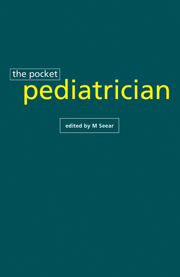Book contents
- Frontmatter
- Contents
- Analytical contents list
- Preface
- 1 Cardiology
- 2 Death and dying
- 3 Emergencies
- 4 Endocrinology
- 5 Fluids and electrolytes
- 6 Gastroenterology
- 7 General surgery
- 8 Health care ethics
- 9 Hematology
- 10 Infectious diseases
- 11 Intensive care and continuous infusion drugs
- 12 Medical genetics
- 13 Neonatology and neonatal drug dosage guidelines
- 14 Neurology
- 15 Nutrition
- 16 Oncology
- 17 Pediatric transport
- 18 Pharmacology and drug dosage guidelines
- 19 Renal
- 20 Resident fellow training
- 21 Respirology
- 22 Rheumatology
- 23 Transfusion medicine
- 24 Appendix
- Index
20 - Resident fellow training
Published online by Cambridge University Press: 01 February 2010
- Frontmatter
- Contents
- Analytical contents list
- Preface
- 1 Cardiology
- 2 Death and dying
- 3 Emergencies
- 4 Endocrinology
- 5 Fluids and electrolytes
- 6 Gastroenterology
- 7 General surgery
- 8 Health care ethics
- 9 Hematology
- 10 Infectious diseases
- 11 Intensive care and continuous infusion drugs
- 12 Medical genetics
- 13 Neonatology and neonatal drug dosage guidelines
- 14 Neurology
- 15 Nutrition
- 16 Oncology
- 17 Pediatric transport
- 18 Pharmacology and drug dosage guidelines
- 19 Renal
- 20 Resident fellow training
- 21 Respirology
- 22 Rheumatology
- 23 Transfusion medicine
- 24 Appendix
- Index
Summary
The key element of your training should be a progressive increase in the level of independent action in all aspects of patient care while still in a situation where you can receive guidance from more experiencd physician peers. This process inevitably involves elements of supervision and direction and relies, for its successful completion, on your motivation and effective involvement. Ultimately, you are the one who determines how well you are trained. The program can only provide the structure on which you build your clinical experience and knowledge. A sense of responsibility for your education and your role in patient care is a key element. Taking appropriate responsibility enhances self-esteem, and your self–esteem has a considerable bearing on how good or bad you decide each day has been. Whatever you feel about your postgraduate training, you will inevitably have moments of extreme doubts. Be reassured that this time is a finite “rite of passage” and with thoughtful management, it can be both a rich and rewarding experience.
Communication
No human being, including the best physician, can get on well with everyone. Though some communication skills are innate, many others can be learned. Residents and fellows with good communication skills are more likely to thrive during training. Clear communication, both spoken and written, improves relationships with other physicians, nurses, children and parents as well as with family and significant others. Communicating the key details of a child's hospitalization to the family physician and/or referring pediatrician is an essential component of good care, particularly at the time of discharge and following emergency transfer.
- Type
- Chapter
- Information
- The Pocket PediatricianThe BC Children's Hospital Manual, pp. 531 - 534Publisher: Cambridge University PressPrint publication year: 1996

